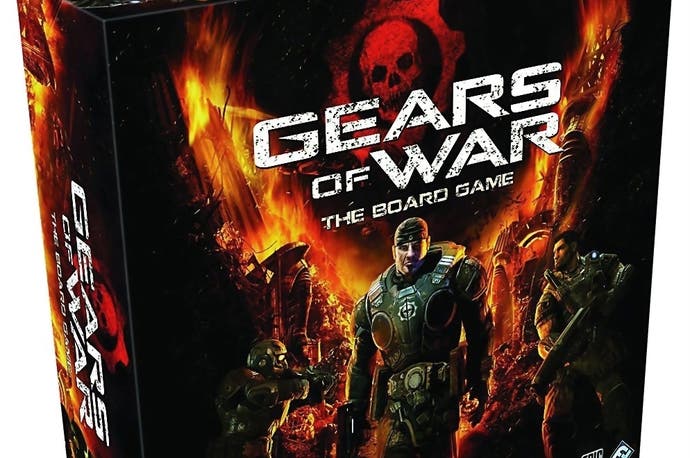Gears of War: The Board Game review
Hoard mode.
Editor's note: Welcome to Eurogamer's first board game review - the start of what we hope will become regular reviews coverage of this exciting gaming scene. While we've chosen to kick things off with a video game licence (and a slightly older game at that), rest assured we'll be highlighting a wide range of contemporary games in these reviews.
Board games are going through a golden age right now, and their links to video games go much deeper than subject matter or shared subcultures. They offer some of the most innovative and thrilling multiplayer experiences around - as well as mechanics that are ripe for theft by video games, as Kieron Gillen argued in his recent piece on the amazing Risk Legacy. You should also check out Paul Dean's article on the rise of the board gaming scene.
We hope you enjoy these reviews! We're new to this stuff, so if you've any feedback, do let us know in the comments below or via the contact form. -Oli
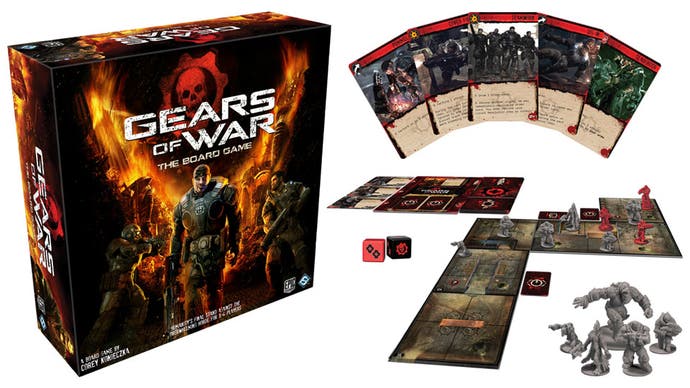
Gears of War: The Board Game. Sounds mad, right? "Do Not Pass Go, Do Not Collect Hammer of Dawn/chest bump/wife." But this is actually the furthest thing from a cynical cash-in. Released in 2011, this game represents Microsoft climbing elegantly aboard the board game bandwagon by farming the license out to Fantasy Flight who, if you held a chainsaw bayonent to my throat, I'd compare to the Hollywood of the hardcore board game world. The COGs survive their transition to cardstock just as well as they survive everything else. This game works... sort of.
Here's how: one to four players set up a mission, randomly arranging modular room tiles and gorgeous Locust miniatures with the goal of co-operatively making their way to the end of the gauntlet. Each of you plays as one of Gears' worryingly rectangular soldiers: Dom, Baird, Cole or the meaty improbability that is Marcus Fenix himself. Let's go! RRAAAARGH.
But hang on; I've got to explain the fascinating puzzle the board game invents for you. At the start, all of you hold six cards drawn off the top of the game's deck of actions. From Roadie Run to Active Reload, Slaughter and Hunkering Down, the Gears tropes are all here. Each turn, every one of you will draw two cards and slap down one from your hand, advancing through the game's deadly machinery, its rooms and miniatures, like actual cogs.
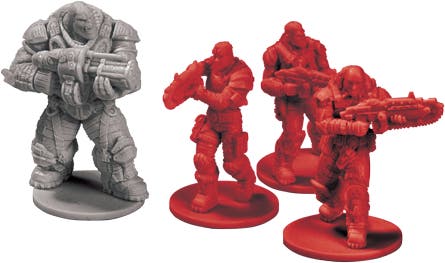
Better yet, all these cards have little Reaction powers. Some cards can be thrown away to let you dodge, take a snap shot, or follow another player as they go hurtling past you. Great.
But hang on again, because those cards are also your health. Oh, yes. Now you're getting it.
It's kind of ridiculous. By so much as moving, your boots are filling with blood. It's worth it for the atmosphere of players getting shot and seeing their options devolve like so much crumbling, masculine masonry. But this is a modern board game, and it knows that players being eliminated is no fun for anyone - so, should you need to discard cards when you have none, instead you'll simply "bleed out" in the Gears style.
There is no sitting still, though, because on everyone's turn you'll be drawing a card off the Locust AI deck. They'll either attack, run at you, or yet more will spawn. This isn't so surprising. Today, most co-op boardgames are powered by panic, Pandemic being the most well-known: a game where players fly around the world as sleep-deprived disease control specialists, chewing their nails down to the quick as four plagues spread exponentially.
What's interesting about Gears, and where it does deviate from the video game, is that you're not scared of the Boomers or Wretches flattening themselves against you like so much plastic paparazzi. They're only a well-placed Bolo Grenade from becoming so much meaty kibble. What scares you is the slow-burning reduction of your character, over half an hour, from a tooled-up professional to an exhausted lump with a scavenged Boom Shield and a Boltok Pistol and no cards at all. You're panicking. You're looking from your cards, to the board, and back to your cards. And you're having fun with your friends because they're all in the same (sinking) boat.
Gears of War also represents a compromise that's unique to board gaming. As a puzzle - and it is a puzzle - it doesn't quite work.
"It's an almost forgotten pleasure, but the box you're paying for here actually contains the arcane thrill of rolling dice and playing toy soldiers."
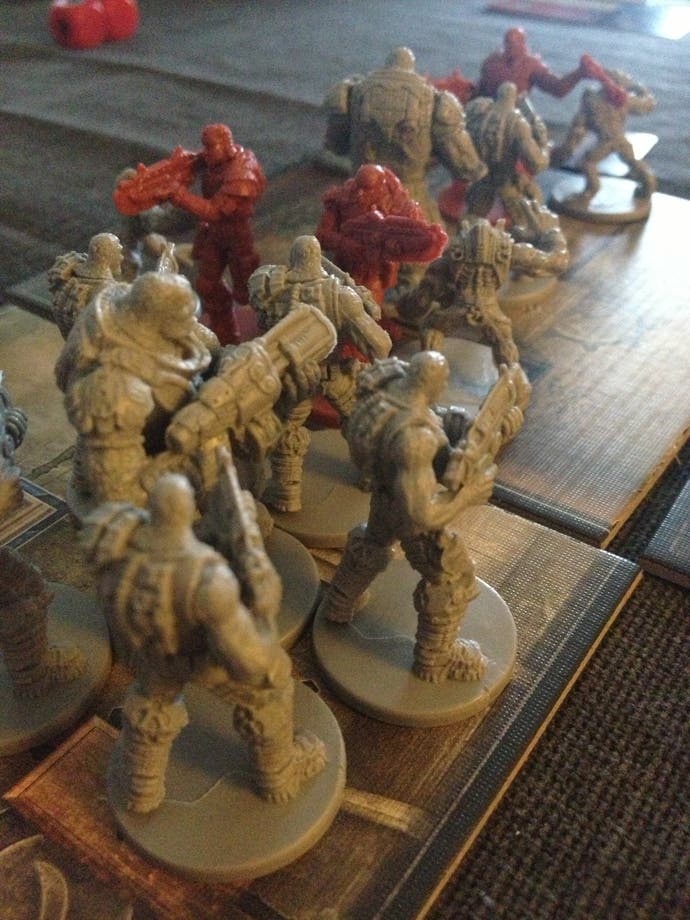
Let's say you, commanding a battered Fenix, wedge yourself in some cover, only for two Drones to come crawling out of an emergence hole. Do you:
- Hunker Down, trying to scrape together some more cards?
- Spray the Drones with your Lancer?
- Arc your last grenade past them, trying to close the emergence hole?
And also: (BONUS ROUND) Do you get your friends to come over and help?
I have no idea what the answer is, because the correct choice lurks down the gun barrel of the game's systems. More stuff probably won't spawn unless your friends kill some. The Drones might not attack, or they might assault you horribly. And could your friends be doing better work elsewhere? They don't know either.
But hang on (again). This is actually OK, because it makes Gears surprising. This isn't chess, it's Dungeons & Dragons; the joy comes from throwing your grenade - from throwing the dice - and sealing the hole to the cheers of your friends. It's an almost forgotten pleasure, but the box you're paying for here actually contains the arcane thrill of rolling dice and playing toy soldiers.
There's still room for moments of brilliance: if someone plays a card to follow you then he'll have no health, but oh my god he has the boomshot and then he can clear that whole room and do it, do it and YEESSSSS. Your friends high-five you as you temporarily haul their asses out of the fire. But the moments that define Gears are when the game excites you with a sudden appearance, a rush of enemies, a doomsday roll of the dice that no-one could have predicted.
Gears of War isn't trying to be a perfect puzzle. It's trying to be fun, and it succeeds. So instead, where I'll criticise it is that actually, as a board game, it doesn't make the most of your friends.
Context is needed. Take the spectacular board game Ghost Stories, which forces players to fight back-to-back against an apocalypse of ghosts - your fates so knotted that a player might decide to sacrifice themselves and you might then talk them out of it. Other co-op board games, like Space Alert and Escape: The Curse of the Temple, have players screaming at each other because the game takes place in real time. Then there are Shadows over Camelot and Battlestar Galactica: games where you watch one another doggedly because someone at the table is a traitor or a Cylon, a double agent who wants everyone else to fail.
These are games that bring you closer to your friends. By contrast, your sole interaction with your friends in Gears is a verbal scraping as you argue the semantics of whether to move now and attack later, or attack now and move later. At its best, you all cheer as someone pulls off a risky gambit, buying you a few feet of breathing room. At its worst, it turns Gears of War into four people sat around stepping on each other's sentences as they state rickety opinions built on imperfect information.
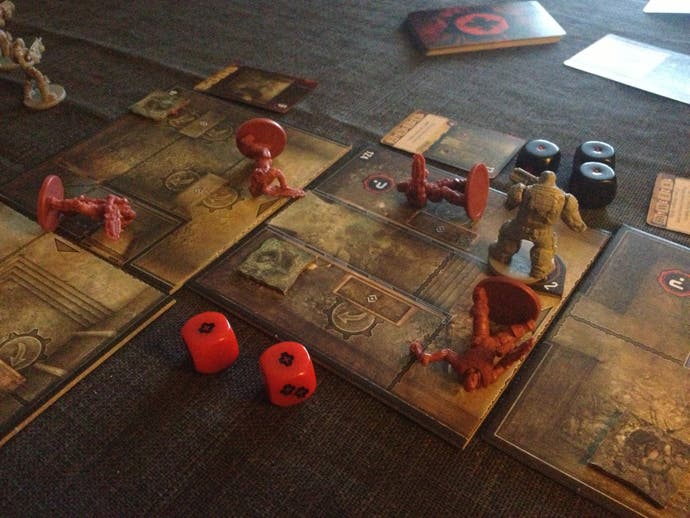
There's also the odd question of who Gears is for. It doesn't capture the video game's high-octane head-shredding and the theme's unlikely to make a dent among haughty board gamers. But I'll tell you who it's for: it's for anybody in love with the idea of rolling dice with their friends. It's for anybody in touch with that untouchable inner child that lets us enjoy moving a tiny plastic man behind two-dimensional cover.
Gears of War isn't a perfect board game. But when you find a Boom Shield card and spend the rest of the game wading forward like hell's own riot police, or clear an entire room of Wretches with one artfully deployed grenade, you won't care. It's not a must, but if your finger ever finds itself hovering over the checkout button on a website - or, better still, you're in a hobby shop and you find yourself holding that big, glossy, shrink-wrapped box - I'd say: spoil yourself.
